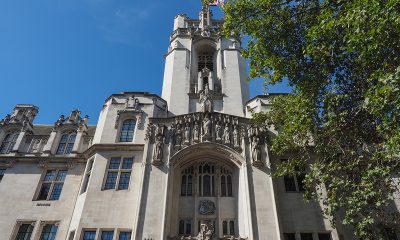World
Honduras government institutions ‘are murdering us’
Lack of opportunities, violence prompt LGBTQ people to migrate
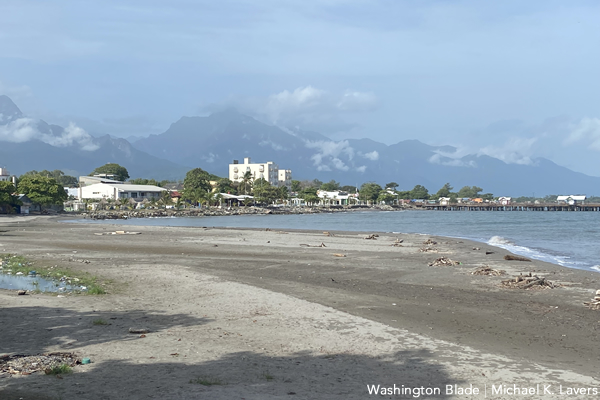
Editor’s note: International News Editor Michael K. Lavers was on assignment for the Washington Blade in Honduras, El Salvador and Mexico from July 11-25.
LA CEIBA, Honduras — Leonela and Jerlín, her partner of 11 years, and their school-age daughter live in La Ceiba, a city on Honduras’ Caribbean coast.
Jerlín was a bus driver in San Pedro Sula, the country’s commercial capital, until gang members shot him three times in 2012 because he couldn’t pay the extortion money from which they demanded from him each month. Jerlín, Leonela and their daughter subsequently fled to La Ceiba, which is about three hours east of San Pedro Sula.
“We left,” Jerlín told the Washington Blade on July 20 during an interview at the offices of Organización Pro Unión Ceibeña (Oprouce), a La Ceiba-based advocacy group. “We fled from there.”
Jerlín migrated to Mexico in January 2019, but returned to Honduras less than a month later because Leonela was in the hospital. The couple and their daughter migrated to Mexico a year later.
Leonela asked for a Mexican humanitarian visa for her and her daughter once they arrived in Ciudad Hidalgo, a Mexican border city that is across the Suchiate River from Tecún Umán, Guatemala.
Leonela told the Blade that she planned to ask for asylum in Mexico and wanted to go to Tuxtla Gutiérrez, the capital of Mexico’s Chiapas state, to find work. Leonela said she and Jerlín instead decided to return to Honduras because they did not want their daughter to further endure the “inhumane” conditions of the migrant detention center in Tapachula, a city that is roughly 20 miles northwest of Ciudad Hidalgo, in which they were living.
“We decided it was better to allow them to deport us,” said Jerlín.
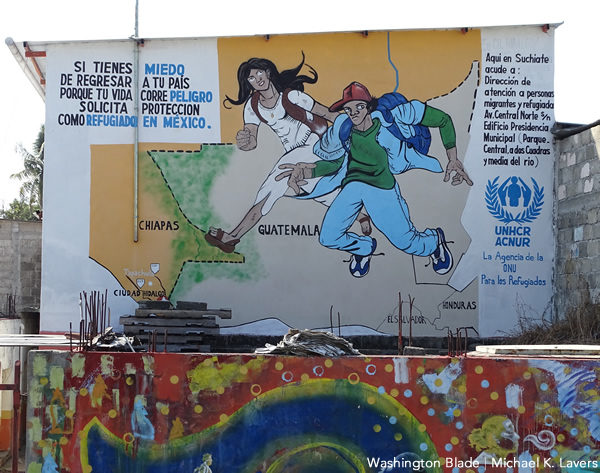
Jerlín, Leonela and their daughter returned to Honduras in May 2020. Someone shot at their house on July 10, 2020.
“They couldn’t even do what people wanted them to do, perhaps even buring us alive,” said Leonela.
Leonela and Jerlín are among the many LGBTQ Hondurans who have decided to leave Honduras in order to escape violence and discrimination based on sexual orientation and gender identity.
Vice President Kamala Harris and other Biden administration officials have acknowledged anti-LGBTQ violence is one of the “root causes” of migration from Honduras and neighboring Guatemala and El Salvador.
Title 42, a Centers for Disease Control and Prevention rule that closed the Southern border to most asylum seekers and migrants because of the coronavirus pandemic, remains in place. The White House has repeatedly told migrants not to travel to the U.S.
Roxsana Hernández, a trans Honduran woman with HIV, died at a New Mexico hospital on May 25, 2018, while in U.S. Immigration and Customs Enforcement custody.
Natasha, another trans Honduran woman, arrived in Matamoros, a Mexican border city that is across the Rio Grande from Brownsville, Texas, on Oct. 12, 2019. The previous administration forced her to pursue her U.S. asylum case in Mexico under its Migrant Protection Protocols. (The U.S. Supreme Court on Tuesday ordered the Biden administration to reinstate MPP.)
The Blade interviewed Natasha on Feb. 27 at a Matamoros shelter that Rainbow Bridge Asylum Seekers, a program for LGBTQ asylum seekers and migrants that Resource Center Matamoros, a group that provides assistance to asylum seekers and migrants in the Mexican border city, helped create. The U.S. less than two weeks later allowed Natasha to enter the country.
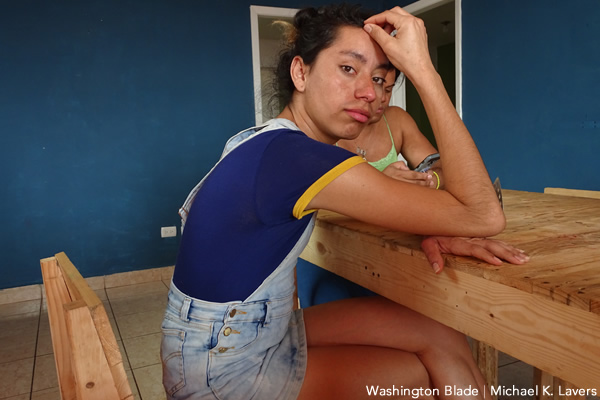
Oprouce Executive Director Sasha Rodríguez, who is trans, has participated in the State Department’s International Visitor Leadership Program.
She said a lack of employment and housing associated with the pandemic has prompted more Hondurans to migrate to the U.S., Mexico and Costa Rica. Rodríguez also told the Blade the U.S. and “our countries sell an American dream that doesn’t exist.”
“Why don’t these American organizations say don’t go,” she said, specifically referring to trans people who have decided to leave Honduras. “Here they see it as beautiful. They are already in the United States, but they were raped while trying to get there. They were kidnapped.”
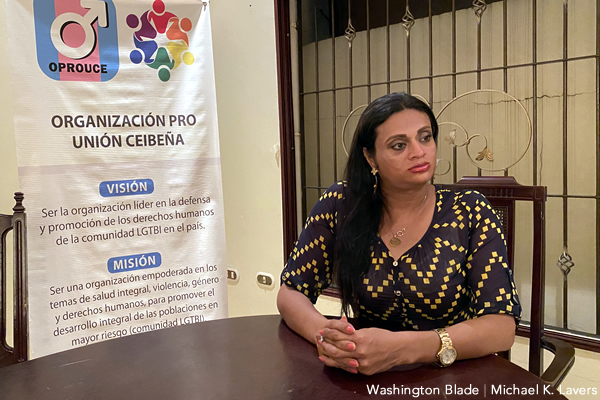
Alexa, a 27-year-old trans woman from La Ceiba, told the Blade she has friends who live in Mexico. Alexa said she would like to leave Honduras, but she doesn’t want to leave her mother alone.
“I don’t want to leave her alone and abandon her because I have always fought for her,” Alexa told the Blade during an interview at Oprouce. “She supports me as a woman.”
Alexa said she served a nearly 3-year prison sentence for attempted murder, even though she was defending herself against a woman who was hitting her in the face with a rock. Alexa began to sob when she started to tell the Blade about the Salvadoran man who raped her in prison. She said the warden then forced her to cut her hair and guards doused her with “ice cold water” in an isolation cell.
“I was a woman,” said Alexa. “They made me a man.”
Alexa told the Blade that other prisoners tried to kill her. She said she also tried to die by suicide several times until her release on Jan. 27.
Alexa said she has not been able to find a job since she left prison. She also told the Blade that gang members continue to threaten her.
“It is sometimes very difficult to lead the lifestyle that we lead as trans women in Honduras,” she said, referring to anti-trans discrimination and a lack of employment opportunities.
Venus, a 30-year-old trans woman who is also from La Ceiba, echoed Alexa.
“To be a trans person is synonymous with teasing, harassment, violence and even death,” Venus told the Blade at Oprouce.
Venus said Honduran soldiers regularly attack trans women. She told the Blade a lack of access to health care, machismo and patriarchal attitudes are among the myriad other issues that she and other trans Hondurans face.
“We don’t have access to education, to health (care), to a job,” said Venus. “Above all we are fighting for a gender-based law that recognizes us as women and men.”
Venus added she, like Alexa, would leave Honduras “if I was given the opportunity to do so.”
Landmark ruling finds Honduras responsible for trans woman’s murder
Red Lésbica Cattrachas, a lesbian feminist human rights group based in Tegucigalpa, the Honduran capital, notes 373 LGBTQ Hondurans were reported killed in the country between 2009-2020.
Statistics indicate 119 of those murdered were trans. Red Lésbica Cattrachas also noted 18 of the LGBTQ Hondurans who were reported killed were in Atlántida department in which La Ceiba is located.
Vicky Hernández was a trans activist and sex worker with HIV who worked with Colectivo Unidad Color Rosa, a San Pedro Sula-based advocacy group.
Hernández’s body was found in a San Pedro Sula street on June 29, 2009, hours after the coup that ousted then-President Manuel Zelaya from power. Hernández and two other trans women the night before ran away from police officers who tried to arrest them because they were violating a curfew.
The Inter-American Court of Human Rights in June issued a landmark ruling that found Honduras responsible for Hernández’s murder.
The ruling ordered Honduras to pay reparations to Hernández’s family and enact laws that protect LGBTQ people from violence and discrimination. The government of President Juan Orlando Hernández, whose brother, former Congressman Juan Antonio “Tony” Hernández, is serving a life sentence in the U.S. after a federal jury convicted him of trafficking tons of cocaine into the country, has not publicly responded to the ruling.
Rodríguez noted to the Blade that Oprouce and other advocacy groups have been fighting for a trans rights law in Honduras for more than a decade.
“We have had failure for 11 years, but I think that with what happened with the Inter-American Court, the recommendations that have come from the Vicky Hernández case could achieve something important,” said Rodríguez. “There are very good human rights recommendations for Honduras and there are good recommendations that Honduras could automatically apply to trans women.”
Rodríguez as she discussed the ruling reiterated trans Hondurans continue to face violence, discrimination and a lack of employment opportunities. Rodríguez also reiterated her sharp criticism of her country’s government and its institutions.
“Societal exclusion forces us to do sex work,” she said. “We are being harmed by our trade: Murder, persecution, hate crimes, torture, beatings.”
“I always say that it is an institutional death because state institutions are murdering us,” added Rodríguez.
‘My fight is here’
In spite of these challenges, Rodríguez said there has been progress.
Oprouce — which works on a variety of issues that include the prevention of gender-based violence and fighting HIV/AIDS — offers workshops to the Public Ministry, the Honduran Armed Forces and judges. Asociación de Prevención y Educación en Salud, Sexualidad, Sida y Derechos Humanos (Aprest), another advocacy group in Tela, a city that is about 60 miles west of La Ceiba, conducts similar trainings with local and national authorities.
Aprest Executive Director Leonel Barahona Medina told the Blade during an interview at a beachfront restaurant in Tela on July 20 that city officials have given him an office from which he and his colleagues can work. Barahona said they also supported activists who raised the Pride flag on June 27 in front of Tela City Hall.
A similar ceremony took place in a park in the center of La Ceiba.
“We have good relations with them,” said Barahona, referring to Tela officials.
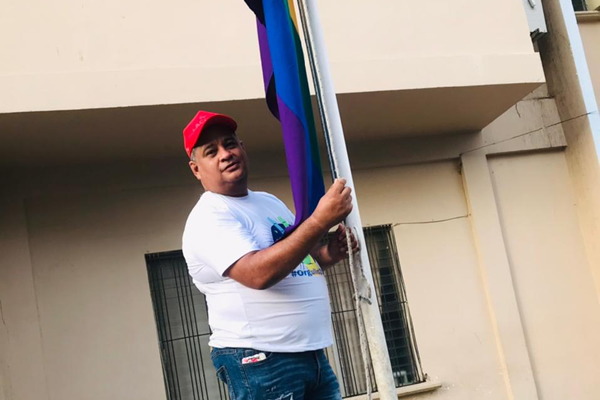
Both Barahona and Rodríguez said their work will continue.
“My fight is here,” said Rodríguez. “My essence and my dreams are here.”
Abdiel Echevarría-Caban and Reportar sin Miedo contributed to this story.
United Kingdom
UK Supreme Court rules legal definition of woman limited to ‘biological women’
Advocacy groups say decision is serious setback for transgender rights
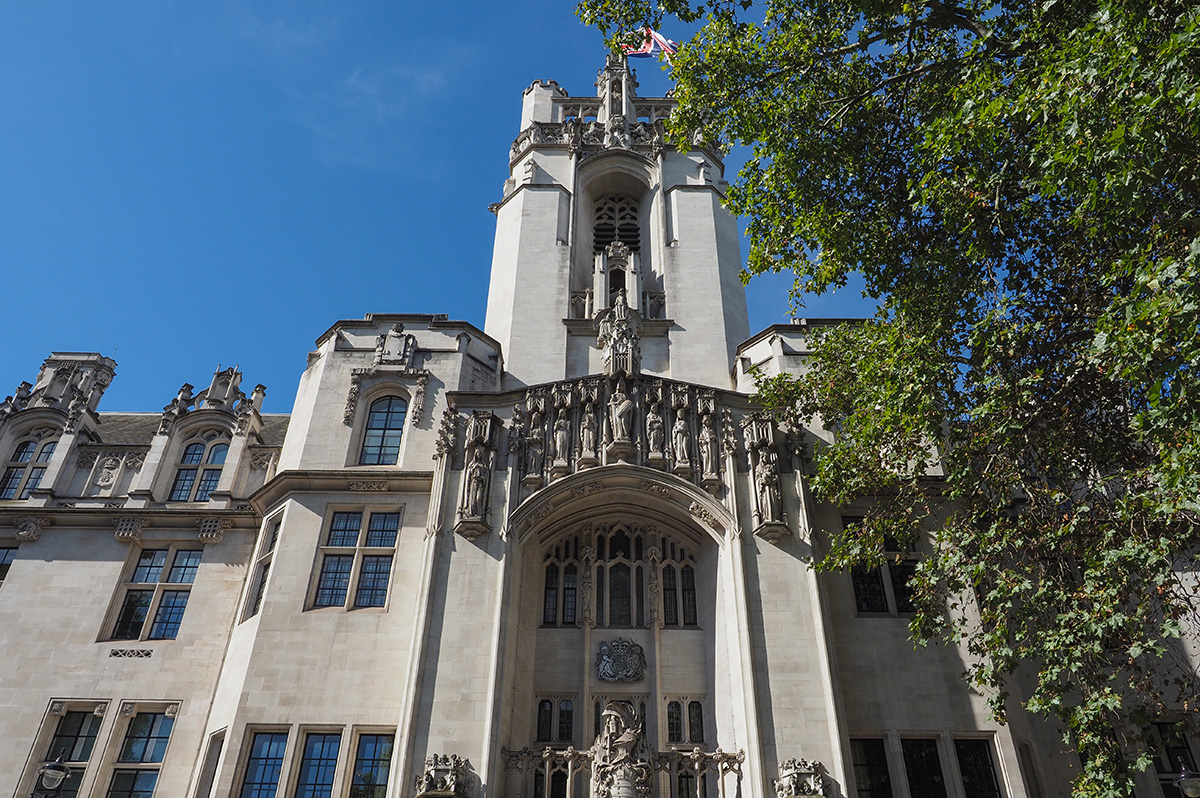
The British Supreme Court on Wednesday ruled the legal definition of a woman is limited to “biological women” and does not include transgender women.
The Equality Act that bans discrimination based on sexual orientation and gender identity took effect in 2010.
Scottish MPs in 2018 passed a bill that sought to increase the number of women on government boards. The Supreme Court ruling notes For Women Scotland — a “feminist voluntary organization which campaigns to strengthen women’s rights and children’s rights in Scotland” — challenged the Scottish government’s decision to include trans women with a Gender Recognition Certificate in its definition of women when it implemented the quota.
Stonewall U.K., a British advocacy group, notes a Gender Recognition Certificate is “a document that allows some trans men and trans women to have the right gender on their birth certificate.”
“We conclude that the guidance issued by the Scottish government is incorrect,” reads the Supreme Court ruling. “A person with a GRC (Gender Recognition Certificate) in the female gender does not come within the definition of ‘woman’ for the purposes of sex discrimination in section 11 of the EA (Equality Act) 2010. That in turn means that the definition of ‘woman’ in section 2 of the 2018 Act, which Scottish ministers accept must bear the same meaning as the term ‘woman’ in section 11 and section 212 of the EA 2010, is limited to biological women and does not include trans women with a GRC.”
The 88-page ruling says trans people “are protected by the indirect discrimination provisions” of the Equality Act, regardless of whether they have a Gender Recognition Certificate.
“Transgender people are also protected from indirect discrimination where they are put at a particular disadvantage which they share with members of their biological sex,” it adds.
Susan Smith, co-founder of For Women Scotland, praised the decision.
“Today the judges have said what we always believed to be the case, that women are protected by their biological sex,” she said, according to the BBC. “Sex is real and women can now feel safe that services and spaces designated for women are for women and we are enormously grateful to the Supreme Court for this ruling.”
Author J.K. Rowling on X said it “took three extraordinary, tenacious Scottish women with an army behind them to get this case heard by the Supreme Court.”
“In winning, they’ve protected the rights of women and girls across the UK,” she added.
It took three extraordinary, tenacious Scottish women with an army behind them to get this case heard by the Supreme Court and, in winning, they’ve protected the rights of women and girls across the UK. @ForWomenScot, I’m so proud to know you 🏴💜🏴💚🏴🤍🏴 https://t.co/JEvcScVVGS
— J.K. Rowling (@jk_rowling) April 16, 2025
Advocacy groups in Scotland and across the U.K. said the ruling is a serious setback for trans rights.
“We are really shocked by today’s Supreme Court decision — which reverses 20 years of understanding on how the law recognizes trans men and women with Gender Recognition Certificates,” said Scottish Trans and the Equality Network in a statement posted to Instagram. “The judgment seems to have totally missed what matters to trans people — that we are able to live our lives, and be recognized, in line with who we truly are.”
Consortium, a network of more than 700 LGBTQ and intersex rights groups from across the U.K., in their own statement said it is “deeply concerned at the widespread, harmful implications of today’s Supreme Court ruling.”
“As LGBT+ organizations across the country, we stand in solidarity with trans, intersex and nonbinary folk as we navigate from here,” said Consortium.
The Supreme Court said its decision can be appealed.
El Salvador
Gay Venezuelan makeup artist remains in El Salvador mega prison
Former police officer said Andry Hernández Romero was gang member because of tattoos
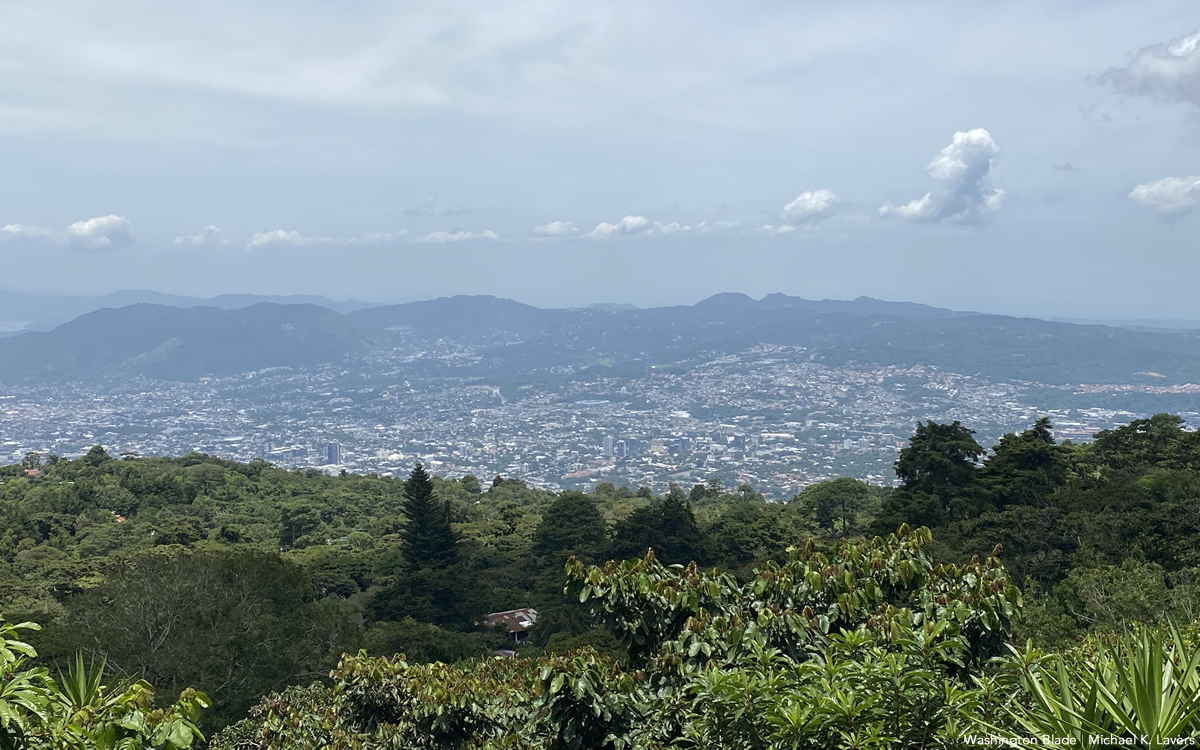
A new investigation points to a discredited, former police officer who played a “key role” in the wrongful deportation of Andry Hernández Romero, a gay asylum seeker and makeup artist who was sent to a maximum security mega prison in El Salvador under Trump’s Alien Enemies Act.
USA Today found in a recent investigation that the former Milwaukee police officer who filed the report about Hernández, citing his tattoos as the reason for the gang affiliation, has a long history of credibility and disciplinary issues in his former police officer position.
The private prison employee who previously worked as a police officer until he was fired for driving into a house while intoxicated — among other alcohol-related incidents — “helped seal the fate” of Hernández.
The investigation by USA Today found that the former police officer accused Hernández of being a part of the Tren de Aragua gang because of his two crown tattoos with the words “mom,” and “dad,” which are now being identified as Venezuelan gang-related symbols.
Since then, his story has made headlines across the nation because Hernández has no criminal record and is legally seeking asylum in the U.S. due to credible threats of violence against him in Venezuela because of LGBTQ persecution.
He was targeted shortly after Trump invoked the Alien Enemies Act of 1798, which is a proclamation for all law enforcement officials to “apprehend, restrain, secure, and remove every Alien Enemy described in section 1 of [the] proclamation.”
Charles Cross, Jr., the former police officer, signed the report which wrongfully identified Hernández as a gang member. Cross was fired in 2012 after many incidents relating to his credibility and how it was affecting the credibility of the department to testify in court.
He had already been under investigation previously for claiming overtime pay that he never earned. In 2007, he had also faced criminal charges for damage to property, according to court records.
In March, the Washington Blade spoke with the Immigrant Defenders Law Center Litigation and Advocacy Director Alvaro M. Huerta regarding the case and stated that “officials with U.S. Immigration and Customs Enforcement and U.S. Customs and Border Protection alleged his organization’s client was a member of Tren de Aragua, a Venezuela-based gang, because of his tattoos and no other information.”
Hernández came to the U.S. last year in search of asylum and now makes up one of 238 Venezuelan immigrants who were deported from the U.S. to El Salvador, Honduras and Venezuela. Many of those being deported are being sent to the Center for Terrorism Confinement, a maximum-security mega prison in El Salvador, which has been accused of human rights violations.
According to the investigation, the Department of Homeland Security “wouldn’t offer further details on the case, or the process in general, but reiterated that the department uses more than just tattoos to determine gang allegiance.”
His story is now being looked at as a cautionary tale of the lack of due process of law the U.S. government is taking, as the Department of Homeland Security and Immigration and Customs Enforcement ramp up deportations across the nation.
Organizations like the Human Rights Campaign are now calling for Secretary of State Marco Rubio and Secretary of Homeland Security Kristi Noem to cease wrongful deportations and return Hernández home. The petition also urges the U.S. government to afford all Americans, forging nationals and asylum seekers residing in the U.S., due process of law as required by the Constitution.
Argentina
Gay, nonbinary parent fights for family in Argentina’s courts
Leonardo Hatanaka alleges they were fired after requesting paternity leave

An unprecedented case could set an important legal precedent for the rights of labor rights for LGBTQ families in Latin America.
Leonardo Hatanaka, a Brazilian pharmaceutical professional, expects an imminent ruling from the Superior Court of Justice in the Autonomous City of Buenos Aires in a case that alleges discriminatory dismissal based on sexual orientation, gender identity, and xenophobia after their son Matteo’s birth in Argentina via “solidarity gestation.” Human rights organizations and international agencies have followed the case closely.
Genzyme de Argentina S.A. and Sanofi in 2023 fired Hatanaka weeks after they notified them of their son’s paternity and requested 180-day parental leave.
“Matteo’s birth was the realization of a dream and the right to form a family with love, dignity and equality, even if that means having to fight every day for our family to be recognized as such,” Hatanaka told the Washington Blade in an exclusive interview.
The National Institute Against Discrimination, Xenophobia and Racism, a government agency known by the acronym INADI that President Javier Milei’s administration has shut down, in November 2023 said Hatanka’s termination was motivated by discrimination based on sexual orientation and gender identity.
(Milei took office in December 2023.)
The General Directorate of Coexistence in Diversity in Buenos Aires’s government in 2024 said institutional xenophobia motivated the firing.
“I am a gay man, foreign, nonbinary, and I had requested to exercise my right to parental leave,” Hatanaka explained. “The company denied access to a basic right to care, which it does provide in other countries, and did not provide any medical coverage for our son, despite his legal registration with both parents’ names.”
Sanofi did not acknowledge responsibility, offer apologies or any kind of reparations, despite the two rulings.
“It was devastating. I was caring for a newborn, at a moment of enormous vulnerability, and the company chose just that moment to abandon us,” said Hatanaka.
The National Labor Court overturned an initial injunction that ordered Hatanaka’s reinstatement. Hatanaka appealed the decision to the Superior Court of Justice in the Autonomous City of Buenos Aires.
“I hope for justice; that the discrimination suffered is recognized, and that this ruling serves as a precedent for all diverse families and LGBTQ+ people who are seeing their rights violated,” said Hatanaka.
The Argentine LGBT Federation, SOS Homophobie in France, and Mothers of Resistance in Brazil are among the organizations that have expressed their support. The latest U.N. report on anti-LGBTQ discrimination also notes the case.
“Companies must go beyond marketing,” Hatanaka emphasized. “Real inclusion requires concrete actions, consistency, and respect for their own policies.”
Hatanaka stressed that “there are instruments such as the UN Guiding Principles on Business and Human Rights. It is time for them to comply with them.” The lawsuit has also become a symbol of the struggle for equality and protection of families with parents who are the same sex.
“I feel I represent many LGBTQ+ families who live in fear of losing everything by exercising their rights,” said Hatanaka. “LGBTQ+ parenting is legitimate, real and deserves protection. No family should be punished for existing.”
-

 The White House5 days ago
The White House5 days agoWhite House does not ‘respond’ to reporters’ requests with pronouns included
-

 District of Columbia2 days ago
District of Columbia2 days agoReenactment of 1965 gay rights protest at White House set for April 17
-

 Hungary2 days ago
Hungary2 days agoHungarian MPs amend constitution to ban public LGBTQ events
-

 Maryland2 days ago
Maryland2 days agoFreeState Justice: Transgender activist ‘hijacked’ Moore’s Transgender Day of Visibility event

